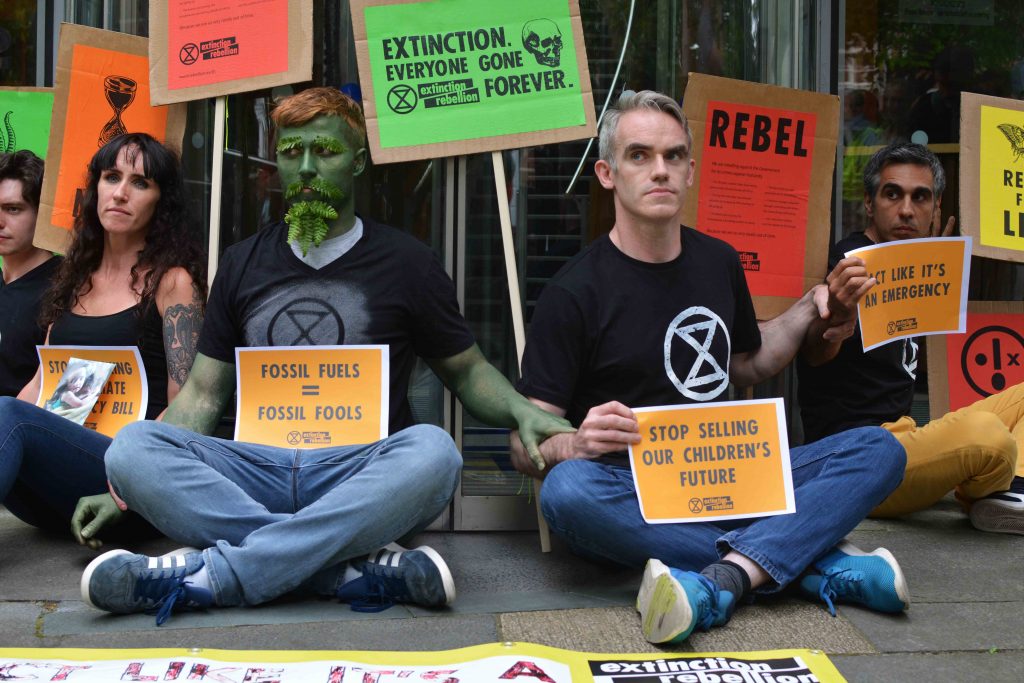150 academics outline support for Extinction Rebellion

October 7th, 2019
Over 150 Irish academics have signed an open letter outlining their support for Extinction Rebellion as activists gear up to disrupt the capital as part of a global week of action.
Extinction Rebellion Ireland (XRI) activists from across the country will band together this week in Dublin as part of the international “Rebellion Week” to highlight climate breakdown and the biodiversity crisis.
XRI want to see immediate government action to halt biodiversity loss and for policymakers to set an ambitious target to reach net-zero emissions by 2025.
Its demand of the declaration of a climate and biodiversity emergency was achieved in May, however, the group argues that concrete policy has failed to follow since.
Irish action will commence at 1PM this afternoon at the entrance of Dail Eireann. From here, the activists will walk in procession led by a large pink sailing boat to a nearby, as yet unnamed, location where the mast of the boat will be launched and a flag with the Extinction Rebellion logo raised.
Speeches will then start around
The group is remaining coy on further actions to take place across the remainder of the week, only stating that they will employ family-friendly non-violent civil disobedience to “bring society to a standstill” and force the Government to respond to the climate emergency.

Blame lies with the State
A letter signed by 153 Irish academics in support of XRI makes it clear that the “social contract” has been broken by the Government, laying the blame for the climate crisis firmly at the feet of the Cabinet for bringing in policies that have caused emissions to balloon and biodiversity to collapse.
It is therefore “perfectly reasonable”, the letter continues, that concerned citizens would “bypass the Government’s flagrant inaction and rebel peacefully to defend life itself”.
“The Irish Government is complicit in ignoring the precautionary principle, and in failing to acknowledge that infinite economic growth on a planet with finite resources is not possible,” the letter reads.
“While our academic perspectives and expertise may differ, we are united on one point: we will not tolerate the failure of this or any other government to take robust and emergency action in respect of the worsening ecological crisis.
“The science is clear, the facts are incontrovertible, and it is unconscionable to us that our children and grandchildren should have to bear the terrifying brunt of an unprecedented disaster of our own making.”
The list of Irish signees includes some of Ireland’s leading minds on climate change and biodiversity, including Executive Dean of the DCU Faculty of Engineering, Professor Barry McMullin, Professor of Geography at Maynooth University Gerry Kearns and Dr Cara Augustenborg from UCD.
Earlier this year, Irish academics also signed an international letter in support for the global school strike movement. The letter states that the students’ climate concerns are “well-founded and rest on solid, incontrovertible evidence”.
An Irish rising
The Irish branch of the global XR movement began over a year ago with a public meeting in the Teachers Club in Co Dublin. Since then the group has grown rapidly with local groups set up across the country.
Writing in The Green News last week, one of the founding members Dr Ciarán Ó Carroll said that the group is taking to the streets as decades of conventional activities such as voting, lobbying, and petition writing has failed to ignite political and public will to tackle the climate crisis.
In April, hundreds of XRI activists brought traffic to a standstill in the centre of Dublin to bring attention to what they called “criminal inaction” from policymakers on the climate and ecological emergency.
The near 1,000-strong crowd marched to O’Connell Bridge where they staged a sit-in, blocking traffic but allowing the Luas to pass in line with the movement’s support for fossil-free public transport.
In July, the group held a smaller-scale week of action, including a “slow cycle” along the Dublin quays to highlight air pollution and traffic issues.
The group also blocked streets and held “die-ins” on Grafton Street and the Natural History Museum, and several members glued themselves to the entrance of the Department of Climate Action (DCCAE).
The international movement began with 10 people in the UK last summer, rising to prominence in November 2018 when thousands blocked bridges and glued themselves to public buildings.
In April, around 500 protesters were arrested in London as activists blocked traffic throughout the city, including at Waterloo Bridge and Oxford Circus, as part of the week of action.
Last week, the Metropolitan police broke down the door of a building in Kennington in South London where Extinction Rebellion activists were storing equipment for this week’s activities.
The move was described by the as a pre-emptive action, with police arresting 10 activists on suspicion of conspiracy to cause public nuisance.
Caroline Vincent, who liaises with the police for Extinction Rebellion, said that the police did not want the group to move equipment that they believed was “going to be used to commit a crime, and the crime is blocking the highway”.
“So pita and pans are considered to be equipment that will be used to commit a crime; cushions too, apparently. The only things we are allowed to move away are first aid kits, milk and fliers,” she added.
So far, the UK police have arrested 21 activists in London. Activists have already blocked bridges close to the Houses of Parliament and locked themselves to a fake missile outside of the Ministry of Defence.
[x_author title=”About the Author”]







